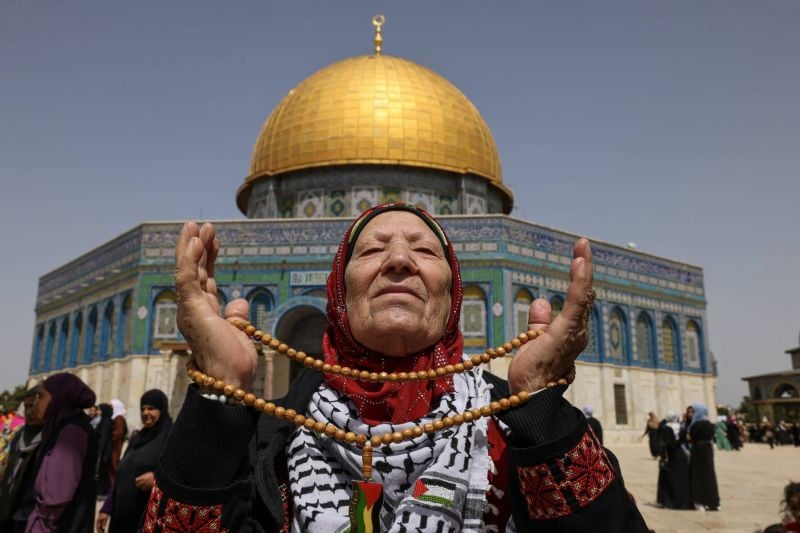
A Palestinian Muslim devotee reacts as she arrives at the compound of the Al-Aqsa Mosque for the third Friday Noon prayer during the Islamic holy month of Ramadan in Jerusalem on April 7, 2023. (Credit: Ahmad Gharabli/AFP)
After an Israeli police raid on the Al-Aqsa mosque worshippers last Wednesday, the following days saw rocket exchanges between Gaza, southern Lebanon, Syria and Israel. On Friday, Israeli officials confirmed they had launched airstrikes on southern Lebanon and Gaza, targeting suspected Hamas infrastructure. Israeli airstrikes on Sunday hit targets in Syria, which has recently seen increased Israeli bombardment — after the fourth attack in less than a week on Monday killed two Syrian civilians. Violence continued to spread after the raid. On Friday, a car-ramming attack in Tel Aviv killed an Italian tourist and wounded seven other people, hours after a shooting in the occupied West Bank killed two sisters, aged 16 and 20, and injured their mother who succumbed to the injuries three days later.
On Monday, Israeli forces shot dead two suspected Palestinian gunmen who opened fire on a military outpost in the occupied West Bank and a 15-year-old Palestinian boy during a raid on the Aqabat Jaber camp, the site of previous deadly Israeli raids this year, near Jericho. It was the third deadly raid in the West Bank last week after Israeli forces killed two Palestinian people during a raid in Nablus last Monday. The same day, the Palestinian Red Crescent Society said they treated more than 100 people for tear gas inhalation after a protest opposing thousands of Israeli demonstrators gathered at Eviatar, an illegal settlement that was vacated in 2021 after multiple Palestinians from the neighboring village of Beita opposing its occupation were killed by Israeli forces. Israeli National Security Minister Itamar Ben-Gvir, present at the rally, expressed hope for the Israeli government to “legalize dozens more [outposts]” — which are deemed illegal under international law. The past year has seen 94 Palestinians, 19 Israelis, one Ukrainian and one Italian killed in the violence, according to an AFP count based on Israeli and Palestinian official sources.
Hundreds of detainees involved in the Yemeni civil war will be flown between Yemen and Saudi Arabia on Thursday, a Yemeni government official said on Tuesday, after Saudi Arabian and Iranian officials met in Beijing to cement their rapprochement. In the biggest prisoner exchange since October 2020, Houthi rebels will release 181 prisoners in exchange for 706 detainees held by government forces. Since a Saudi military intervention after to the seizure of Sanaa by Houthi rebels, the war in Yemen has led to the deaths of hundreds of thousands of people in what the United Nations has called one of the worst humanitarian crises in the world. On Monday, the Saudi ambassador to Yemen visited Sanaa to stabilize a truce and ceasefire. Last Thursday, Saudi Arabia sought to advance a recently brokered reconciliation with Iran during a Beijing meeting. An Iranian delegation is expected to visit Saudi Arabia ahead of the reopening of Iran’s embassy in Riyadh.
France for the first time ordered Syrian officials to stand trial on charges of collusion in crimes against humanity for the deaths of two French-Syrian nationals, Mazzen Dabbagh and his son Patrick. The decision comes five years after Mazzen and Patrick Dabbagh’s family filed a complaint with the French judiciary. French investigating judges issued international arrest warrants against Baath party official Ali Mamlouk, Syrian Air Force Intelligence Directorate former and current officers Jamil Hassan and Abdel Salam Mahmoud, who are not expected to show up for the trial. The judiciary said that it "seems sufficiently established" that Mazen and Patrick Dabbagh were subjected to torture "so intense that it killed them." Last January, a German court held the first global trial over state-sponsored torture in Syria.
The Iranian Parliament on Sunday adopted proposals enforcing stricter penalties for violence against women, a day after the police announced the installation of cameras to help enforce the mandatory dress code for women. The Iranian parliament’s adoption of the “preventing harm to women and improving their safety against misbehavior” draft law follows pleas from human rights groups and comes after a wave of poisoning attacks against schoolgirls and widespread protests over the death in Iranian morality police custody of 22-year old Mahsa Amini — who was arrested for allegedly violating the country's strict dress code for women. On Saturday, the Iranian police said public places would be equipped with cameras “preventing resistance against the hijab law” as a growing number of Iranian women publicly reject the strict dress code.